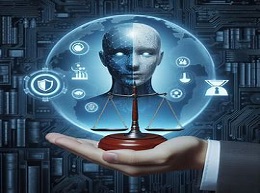AI in Criminal Justice: Balancing Innovation and Ethics

AI in Criminal Justice: Balancing Innovation and Ethics
Artificial Intelligence (AI) is increasingly integrated into various aspects of the criminal justice system, promising improved efficiency and effectiveness in areas such as predictive policing, risk assessment, and sentencing. However, the use of AI in criminal justice also raises significant ethical concerns related to bias, fairness, and privacy. In this article, we'll delve into the complexities of AI in criminal justice, examining its applications, challenges, and the need for ethical considerations.
Predictive Policing: Predictive policing algorithms use historical crime data to forecast future criminal activity and allocate law enforcement resources accordingly. While proponents argue that predictive policing can help prevent crime and improve public safety, critics raise concerns about bias and discrimination inherent in the data used to train these algorithms. For example, if historical crime data reflects biased policing practices, predictive policing algorithms may perpetuate and exacerbate existing disparities in law enforcement outcomes.
Risk Assessment and Pretrial Decisions: AI-driven risk assessment tools assist judges and policymakers in making pretrial decisions, such as bail and sentencing, by predicting the likelihood of a defendant's reoffending or failure to appear in court. While these tools aim to improve fairness and consistency in decision-making, studies have shown that they may disproportionately impact marginalized communities and perpetuate racial and socioeconomic biases. Moreover, the opacity of these algorithms raises concerns about transparency and accountability in the criminal justice system.
Sentencing Algorithms: AI algorithms are increasingly used to assist judges in sentencing decisions by analyzing various factors, such as criminal history, severity of the offense, and demographic information. However, concerns have been raised about the fairness and accuracy of these algorithms, as they may encode and perpetuate biases present in historical sentencing data. Moreover, the lack of oversight and accountability mechanisms for these algorithms raises questions about due process and the right to a fair trial.
Facial Recognition and Surveillance: Facial recognition technology is utilized by law enforcement agencies for identification and surveillance purposes, raising significant privacy and civil liberties concerns. Critics argue that facial recognition algorithms are often biased against certain demographic groups, leading to wrongful arrests and discriminatory targeting. Additionally, the widespread deployment of facial recognition systems without proper regulation or oversight poses risks to individual privacy and freedom of expression.
Ethical Considerations and Accountability: The use of AI in criminal justice raises profound ethical questions about fairness, accountability, and the protection of civil liberties. Policymakers, law enforcement agencies, and AI developers must prioritize transparency, fairness, and equity in the design and deployment of AI systems in the criminal justice system. Moreover, mechanisms for accountability, oversight, and recourse must be established to address instances of bias, discrimination, and injustice resulting from the use of AI technologies.
In conclusion, while AI has the potential to enhance efficiency and effectiveness in the criminal justice system, its use must be carefully balanced with ethical considerations and safeguards to ensure fairness, accountability, and respect for civil liberties. By addressing concerns related to bias, transparency, and accountability, policymakers and stakeholders can harness the transformative power of AI to advance justice and equity in society. As AI technologies continue to evolve, ongoing dialogue and collaboration are essential to navigate the complex intersection of innovation and ethics in criminal justice.